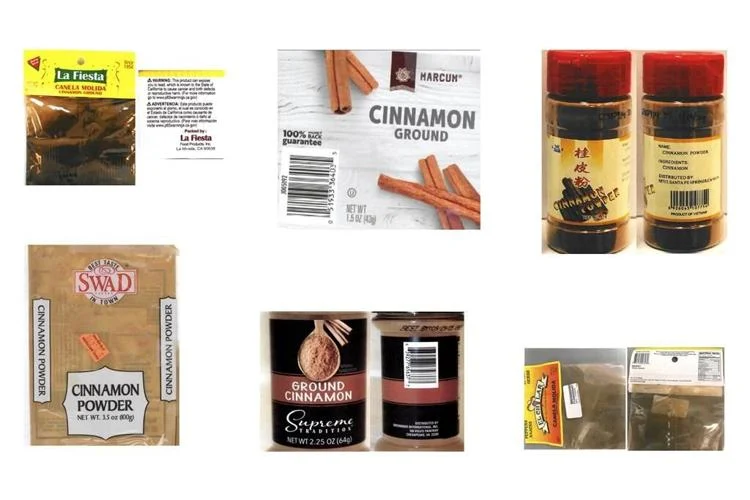
Cinnamon Products sold in U.S. discount stores which contain elevated levels of Lead. (Photo: FDA via AP)
Several discount retailers in the United States have recalled ground cinnamon packages following a warning from federal health officials about high levels of lead contamination.
The U.S. Food and Drug Administration (FDA) issued a safety alert concerning six brands of cinnamon, including those distributed by Dollar Tree and Family Dollar stores. This action came after significant recalls last autumn of WanaBana and other cinnamon applesauce pouch brands associated with nearly 500 cases of lead poisoning in young children across 44 states. The FDA initiated testing on retail samples of spices to ascertain if other products were similarly contaminated.
The recent recalls have prompted concerns about the safety of cinnamon, a widely used spice in American households.
Here's what you need to know:
Which cinnamon brands are affected by the recall?
Recalls have been announced for Marcum and Supreme Tradition brand ground cinnamon, available at Dollar Tree, Family Dollar, and Save A Lot outlets nationwide. Additionally, El Chilar brand cinnamon, sold at La Joya Morelense in Baltimore, Maryland, and Swad cinnamon powder, distributed at Patel Brothers stores across the U.S., are also included in the recalls. FDA officials stated their inability to contact MTCI of Santa Fe Springs, California, which distributes MK brand cinnamon sold at SF Supermarkets in various states.
What levels of lead were found in the cinnamon?
FDA tests revealed lead levels ranging from 2 parts per million to 4 parts per million in the recalled cinnamon, significantly lower than the 2,000 to 5,000 parts per million found in the ground cinnamon from Ecuador that contaminated the applesauce pouches.
Although there is presently no FDA limit for heavy metals in spices, the agency has established a limit of 1 part per million of lead in candy likely to be consumed by small children. The American Spice Trade Association, an industry trade group, advocates for no more than 2 parts per million of lead in bark spices like cinnamon.
Where did the contaminated cinnamon originate?
The origin of the recalled cinnamon remains uncertain, as does its production location, according to FDA officials. Cinnamon in the U.S. originates from various countries, including India, Sri Lanka, Vietnam, and other parts of Southeast Asia. However, the FDA stated there is no evidence to suggest that the recalled cinnamon originated from the same Ecuadorian supplier involved in the contaminated applesauce pouches.
How does lead enter cinnamon?
Karen Everstine, technical director for FoodchainID, noted that many foods, including spices, contain lead from natural sources such as soil and water. Spices can also accumulate lead from environmental pollution, including leaded gasoline. Additionally, some lead contamination may occur during manufacturing, storage, or shipping processes.
In certain instances, spices have been adulterated with substances, including lead, to enhance color or weight, thereby increasing product value. FDA officials have suggested that the applesauce pouches may have been deliberately contaminated for economic gain.
What are the health implications of lead in spices?
Health officials emphasize that no amount of lead is safe and should be avoided. While the potential harm from any single use of spices containing lead is minimal due to their small quantities, prolonged exposure over weeks or months could lead to health issues.
Lead exposure can result in long-term health problems in adults, such as a higher risk of high blood pressure, heart disease, and kidney damage. It is particularly detrimental to children, affecting basic intelligence, learning, and behavior.
How can consumers avoid lead-contaminated spices?
It can be challenging to determine whether spices on grocery store shelves are contaminated with lead or other toxins, Everstine explained. Consumers are encouraged to purchase spices from companies that publicly affirm they monitor their sources, as they are motivated to safeguard their brands. While grocery prices, including spices, may be high, it could be worth prioritizing safety over cost. Consumers should be cautious of suspiciously low prices, as effective supply chain control requires investment.
In summary, the recent cinnamon recalls underscore the importance of vigilance in food safety and consumer awareness regarding potential contaminants in everyday products.















